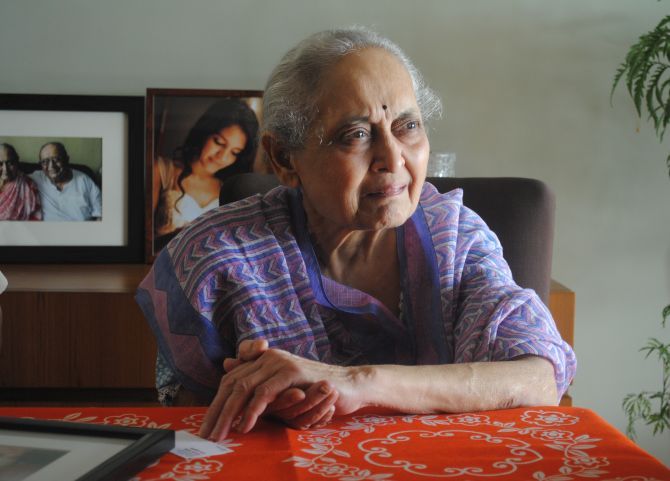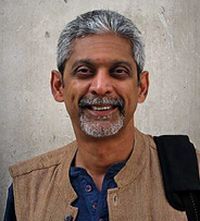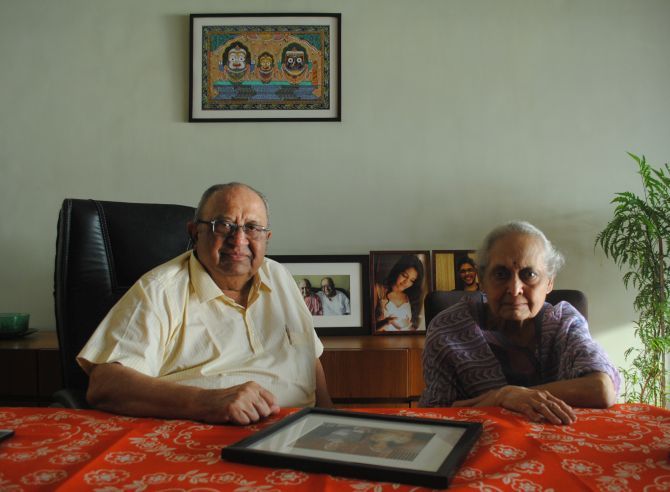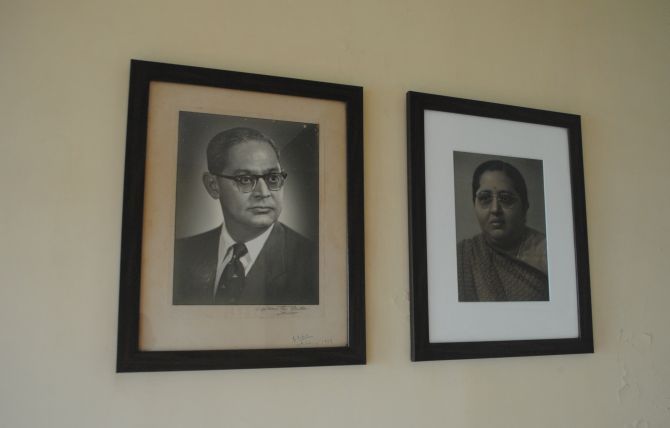Sheela Bhatt meets Bharti Patel, whose son Dr Vikram Patel was recently ranked one of Time magazine's 100 most influential people, to find out her recipe for a remarkable upbringing.

Time magazine's list of 100 most influential people of 2015 featured four Indians: Prime Minister Narendra Modi, Chanda Kochhar, managing director and CEO, ICICI Bank, Microsoft CEO Satya Nadella, and Dr Vikram Patel, co-founder of the Goa-based NGO Sangath which provides mental healthcare to communities with low resources.
Dr Patel, a psychiatrist, has been focusing on global mental health(external link), his passion being to raise his voice for the human rights of individuals with mental disorders. He is also a professor of international mental health at the London School of Hygiene and Tropical Medicine.
Dr Patel's body of work has been published in Lancet, the well-respected medical journal, and he has created immense awareness in the field of mental healthcare. As the Sangath Web site notes, 'Dr Patel studies how to treat conditions like depression and schizophrenia in low-resource communities, and he's come up with a powerful model: Training the community to help.'
 Dr Patel, image, left, is known for his research in finding the link between mental disorders and poverty, and ranks along the likes of German Chancellor Angela Merkel and Japanese novelist Haruki Murakami because of his pioneering work. He is one of the founders of the Centre for Global Mental Health, having served till recently as its joint director.
Dr Patel, image, left, is known for his research in finding the link between mental disorders and poverty, and ranks along the likes of German Chancellor Angela Merkel and Japanese novelist Haruki Murakami because of his pioneering work. He is one of the founders of the Centre for Global Mental Health, having served till recently as its joint director.
In Delhi he is associated with the Centre for Chronic Conditions and Injuries at the Public Health Foundation of India.
As the co-chair of the Grand Challenges in Global Mental Health (external link), Dr Patel is passionate about identifying research priorities in global mental health. His book, Where There Is No Psychiatrist, is considered a must read for those serving people with mental disorders, while it teaches the rest of us how to approach mental health.
However, the story is not about how Dr Patel reached the pinnacle of success.
At a time when we see Arushi Talwar's convicted parents in prison or another parent, Indrani Mukerjea, in police custody suspected of having murdered her daughter, something inside society's soul gets shaken.
Sheela Bhatt spoke to Bharti Patel, Dr Patel's ageing and ailing mother, who narrates her extraordinary emotion-soaked struggle to bring up her child who saw death thrice before he went to regular school. And how 100 mothers may have contributed to the greatness of the men and women on Time's 100 most influential list.
Bhartiben is the Mother India of the 20th century for more than one reason. Her story highlights patience, wisdom, grit, value-based parvarish and boundless faith in God. A combination of value systems that provided the divine touch to Dr Vikram Patel, her loving son.
I have three children. My only son, Vikram, was born in 1964. In traditional Gujarati families the first boy is given the 'Yamuna snan' (a special shower for babies) at the Shrinathji temple. He was born healthy and we went to the Nathdwara temple for that baby bath. I don't know what happened soon after, but he was found to have chronic asthma. It was difficult for a toddler. He used to have cold and cough, but the doctor said it was more serious than that.
Once the doctors told me he was unlikely to survive. Actually, on three occasions, we had lost all hope about Vikram. He came close to death, but by God's grace he survived, every time.
My mother-in-law had died early and I had to join my father-in-law Bhagwatprasad Patel (B R Patel) when he was appointed India's ambassador to Belgium. We stayed there for four years. My father-in-law was a distinguished ICS (Indian Civil Service, which precded the Indian Administrative Serice) officer who once headed Air India. I got the courage to shift because I thought I would find a cure for Vikram in a foreign land.
Asthma, when it afflicts a child, is more painful than when it does adults. During an asthma attack a child finds it difficult to breathe, as it happens to adults, but because he is innocent and does not know why it is happening to him, it is difficult to handle for him.
Such children have many allergies too. Vikram had a chana (gram) allergy, he could never have Gujarati Kadhi as it contains gram flour. Even today Vikram can't have chana or any dish with it. He can't have most of the yellow items in a Gujarati kitchen.
Since his asthma was so intense we had no clue how long he would live, so we did not think much about his education. My father-in-law thought even if he survives, he won't pass the 12th standard. He was always in and out of hospitals. But somehow, God saved him.

During his childhood he needed to be given an injection every day, and had the strictest possible diet restrictions. Most items in my kitchen were not acceptable to him. When we returned from Belgium to our Marine Drive home in Mumbai, he was admitted to the Campion school where he excelled. In fact, in Belgium, where the medium of instruction was French, Vikram learnt the language very fast. He would mostly top his class in all subjects.
What was unique about Vikram was that although he was sick, he never harassed me. Initially I was very strict with him to ensure that he studied. But when I saw he was sick all the time, hardly eating anything, I left him alone to make his own schedule.
He had always wanted to be a doctor. Seeing his physical condition everyone would laugh at his dream. How could a seriously ill boy, who may not even live long enough, become a doctor? But Vikram was determined. He would bag all the prizes in school in science, math, geography etc.
He passed the 12th standard on the merit list. He had a permanent handicap because he could not participate in sports as he was sick, so he never got that added advantage of extra marks. Due to breathing problems he could not run. I remember how Vikram was upset in the morning when his 12th standard result was due. He said, 'Ma, I will get less marks because sports marks will not be added to my grand total. I will get less than 98%.'
When he was admitted for the MBBS he went to do his internship in Goa where his friend Gauri, who is now his wife, gave him the form for the Rhodes Scholarship. He filled it although I was sure that Vikram won't get in because of his physical condition.
Vikram shared with me his plan, but I didn't share it with the family. My husband Harshad and I were delighted when Vikram came back from Goa and said he wanted to go to Jamshedpur to meet Rusi Mody of Tata Sons who was to conduct the Rhodes Scholarship interview along with some other well-known people. It was very big news for me.
My son, who could only plan his life one day at a time, had been selected for an interview along with 15 others. Six people including Mody were on the panel. The selection process went on for four days.
Vikram is essentially a simple person. Even though he has asthma, he never allows a coolie to handle his luggage, he manages his own bags. He was asked to wear a suit to one event for the scholarship process, so his father got someone's suit for him. He doesn't wear a suit even now. Till he got his MBBS degree he had not worn a suit. Till then he never even had his own shirt! He would wear his grandpa and father's old shirts. He wore slippers for a long, long time.
I still remember how Vikram called from Jamshedpur to say, 'Ma, I got all six votes (of the selectors panel)! It was a record for the Rhodes Scholarship process in India then. I went down on my knees to thank Thakorji (Lord Krishna) profusely.
Vikram was so sick and he was suffering so much that sometimes I would plead to Thakorji to please take him away, I could not bear to see his pain. We had no hope for him. Even my mother had lost hope.
In Belgium nobody was ready to admit him while my daughters were accepted everywhere. My mother could not help me much in bringing him up as he was so sick.
Education is very important for me, I never allowed my children to ignore their studies. I got married at an early age. I had a degree from Sophia College and wanted to pursue my career, but my mother-in-law told me to leave aside advance studies and manage the household instead. I told all my three children that I would be rigid about ensuring that all of them study well.
Once you study, stand on your own feet and show me your first salary after which I will not come in your way. I will see to it that you marry the person you want.
I strongly believed that the future lies in good education. We never had huge amounts of money, my husband Harshad was a professional, not a businessman. What would my children do without money to invest in them? So I wanted them to be well educated.
My in-laws and other relatives from Dharmaj (a town in Gujarat) were conservative, but my faith in education was strong. My elder daughter Natasha did her MPhil from JNU. She was selected by the French government for a doctorate at Sorbonne University. She now works in London for a multinational bank, heading a department. My younger daughter Sheena stood first in Maharashtra in her final MA exams; her subject was French literature. She is in Paris right now.
Vikram was in Goa for many years, but for his son Farai's studies, they have got a house in Delhi. My grandchildren are doing excellently in their studies.
Our family was clean in money matters. My father-in-law and husband earned money the legitimate way. We never even earned interest from investments. Vikram once informed us that a Mumbai medical college offered seats for Rs 2 lakhs (Rs 200,000) each. My father-in-law got angry and scolded him, 'Do you want me to pay Rs 2 lakhs for your future? Go inside your room and don't show me your face!' It was against his principle to pay for education. My father-in-law did not even allow tuitions, he believed a good school is your tuition.
After hearing that, Vikram immediately left with his sister for Lonavla. In the late afternoon we received a telegram and I was scared. We always lived in constant fear of getting bad news about his health. I sat at the table before opening it, as I thought it may be about Vikram's health, he was so weak. I thought the telegram was from my daughter in Lonavla. But it read, 'Congratulations! Vikram Patel is in merit list!'
I was overwhelmed, my son who had dim hopes of surviving since many years, had made it as a topper. My son didn't need money for education, he made it on his own.

Vikram, as I said, is a simple man. He hardly watched TV when growing up. He doe not SMS, but calls me. He is not addicted to Twitter or Facebook. All the time he writes, writes and writes. There are many papers to his credit.
He did his degree in psychiatry and his PhD as well. When his wife Gauri was studying, he managed the home and kitchen. Both of them stayed in Zimbabwe for three years for a project. While studying they had no money at all.
We never expected such high recognition like being nominated to Time magazine's 100 most influential people list. After doing his MBBS he saw the malpractices in the medical profession and is dead against it. So he decided to not practise, but serve the poor by taking up teaching.
My son has travelled to many, many, villages. He has noted that in villages there are no psychiatrists and people suffer mental disorders silently. In Goa he trained local girls and boys. He developed the manual at Sangath to handle such cases. Even without setting up hospitals and dispensaries, he helped the local people treat their relatives and neighbours who were suffering from mental disorders.
He started out in a small corner provided by a local hospital where he had done his internship. He started very small, with just a table and few chairs and had some four, five poor men and women to help. He took me there to show what he was going to do. He wanted to train, for free, poor people to treat mental disorders in villages. We had no money to invest.
When I saw his table and chair in Goa I wondered, 'How will he ever come up in life?' Vikram asked me, 'Ma, you are thinking of my future?' I asked him 'Who will give you money?' He worked step by step. He got so much recognition for his work that his institution was awarded the best NGO. He worked with families of rape victims, suicide cases and took interest in settling them.
WHO wanted his medical manual for mental health. As long as you distribute it for free, he told WHO, you can translate it into as many languages as you want. It was distributed in 70 countries.
Vikram has retained his Indian passport as he wants to settle down only in India. Even now he has to follow diet restrictions. He has very weak eyesight, it's a hereditary problem. He can't eat dhoklas or khandvis. Gauri doesn't store grams in her house. In his early days most times I gave him mixed vegetable soup and fish.
I am a believer of Pushti Marg (of the Vaishnav sect). My son always greeted me with 'Ma, Jai Shri Krishna' whenever he called me. I ensured that he accepted the Brahma-Sambandh (initiation into the Pushti Marg). It is a sacred procedure (external link) of the Pushti Marg sect. He did it when he was young. He believed in all these at a young age, but doesn't do all this now. He stopped suddenly. He even stopped saying 'Jai Shri Krishna.' I didn't say anything.
Some years ago he said he wanted five minutes with me. He then sat down with me and asked why I had not questioned him about why he had stopped saying 'Jai Shri Krishna.' Vikram then narrated his sorrowful experience at the KEM hospital (the King Edward Memorial hospital in parel, north-central Mumbai, one of Mumbai's leading civic hospitals).
One day he said he got the body of a married woman for post-mortem. He was surprised to see that she was still a virgin. He then found out from her husband that they lived in a single room with a large family, including the in-laws. After marriage they could never get any privacy. They had no time, no money and no place to meet privately and consummate their marriage.
One day, the couple decided to go to Juhu beach for some privacy. That evening, they were robbed by goons and in the scuffle the wife died before they could rape her. Vikram asked himself, 'Where is god? What was the crime of that woman?'
He has started saying 'Jai Shri Krishna' again.









